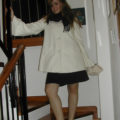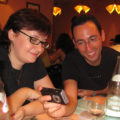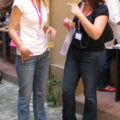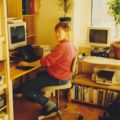I don’t claim to be a comprehensive resource on any aspect of living in Italy; my reasons for being here are different from some others’: I married into it, which made getting a visa (permesso di soggiorno) and permission to work relatively easy. And that was years ago, so what little I remember about the process is probably out of date. There are sites with expertise to offer about the law and other technicalities; you’ll find some listed here.
When I first arrived here, I had been a mostly stay-at-home mom (in New Haven) since Rossella’s birth, and I was ready to go back to work. I had very little experience in job hunting anywhere, let alone in Italy. One of my major saleable skills was desktop publishing, which in those days was still an arcane art that could be sold as a third-party service. The closest thing I could find in the Milan Yellow Pages was “editoria elettronica”. Neither Enrico nor I was sure what that meant, but I sent off a resumé and cover letter to each of the four or five companies listed. Deafening silence ensued.
I pounded the pavements, taking my resumé to computer firms that might need someone who knew how to put systems together and train people to use them. Showing up with a resumé at an office where no one knows you is not the done thing in Italy; people stared at me uncomprehendingly, and at one place they literally laughed in my face.
I didn’t know what else to do to find computer work. Contacts are all-important in Italy, and I had none in the high-tech field. I did get a few translation jobs, thanks to my father-in-law. This was also the period in which I accidentally became a computer journalist. I could have taught English, but the idea didn’t attract me, and I didn’t want to fall into teaching as a career when I had other skills that ought to be far more valuable.
In June (1991), Enrico had a chance to return to Yale for an academic visit, and Alitalia happened to be offering two-for-one tickets. I figured that, if I couldn’t find work, I might as well go on vacation. So we left Rossella with her grandparents and prepared to take off for a week. This was on a Sunday morning. We were putting luggage into the elevator when the phone rang. I answered it, and the conversation went more or less like this:
“My name is Caffarelli. I received your resumé a while ago. Could you write a software manual?”
“Uh, yes, I guess so.”
I had never actually written a manual, but I had designed and written course materials to train people in using desktop publishing software, and had worked with a friend on a manual he had written for a deep-ocean exploration and recovery apparatus. I didn’t think I’d make a fool of myself in the attempt, at any rate.
When I returned from the trip, I went to meet Fabrizio Caffarelli, who had founded a software company in Milan a few years before. The software in question was for optical character recognition, which I actually knew something about – I had beta-tested some scanners and software, back when a 100 dpi black-and-white scanner cost $10,000. So I wrote the manual, in English, and it was “simultaneously” translated into Italian by Fabrizio’s niece Cristina. We had a great time doing it.
At the end of the six weeks or so that the project took, Fabrizio said to me: “I like the way you work but, unfortunately, I don’t have any more work for you right now.” We parted on good terms, and I recommenced the job hunt (well, not until September — no one does anything in Italy in August). I wrote a few more articles for computer magazines, and began to wonder whether I could write a book about something computer-related, perhaps in Italian. I was casting about for a topic when Fabrizio called, sometime in November. “Would you like to write a book with me?” he asked.
So we wrote Publish Yourself on CD-ROM, published (in English) by Random House. It was one of the first books in the world to include a CD. We didn’t get paid much for writing it (and Fabrizio took the lion’s share of what little there was), but I made some extra money on the deal by desktop-publishing it myself, using FrameMaker software. I also used FrameMaker to create a hypertext version of the book to go on the disc, a skill which was to come in handy later on. The disc mainly contained a demo version of Easy CD 1.0; Fabrizio’s reason for writing a book was to publicize the software by showing how easy it could be to make your own CDs – if you had our software, of course.
By the time the book was published (January, 1993), I was working full-time for Fabrizio, writing software manuals and other materials, and doing just about anything else that came up. (The small-company environment suits me precisely because I get to wear a lot of different hats, and people aren’t so territorial about their jobs.)
Fabrizio moved the engineering team to California in late 1993, and, having conquered the 75% of the worldwide Windows market for CD recording software, sold the company to Adaptec in August, 1995. I was hired by Adaptec and had a very good run with them, and later with the Roxio spin-off, until I quit in 2001. Along the way I helped a few other people find work (hired some myself), in Italy and elsewhere. Most of the freelance work I’ve had since has come through friends: good karma pays off, I guess.
In sum, it’s hard to advise anybody on how to find work in Italy, except in these very general terms: be flexible and patient, meet a lot of people, and when opportunity knocks, be ready to leap on it.
Multitasking
Feb 4, 2004
I said, “I developed a new skill with Fabrizio: simultaneous translation and transcription. If he wanted something written in English, he would dictate it to me in Italian, and I would type it straight out in English. I’m not sure I could do simultaneous translation if I had to speak, but I can do it typing, as fast as he can talk.”
Mike L. responded: “According to recent studies, this is something that (almost) only women can do. The explanation behind this is that the female brain is better capable of handling multiple tasks simultaneously, such as translating and writing. The experiments were quite funny to watch. One person would read a series of words, while the test person was asked to repeat after him. Most of the females managed to speak just a single syllable (sometimes even less) behind, while most of the males had to wait longer. My explanation is that males are equally well capable of multitasking, but one task is constantly allocated to thinking about sex – sex – sex…







